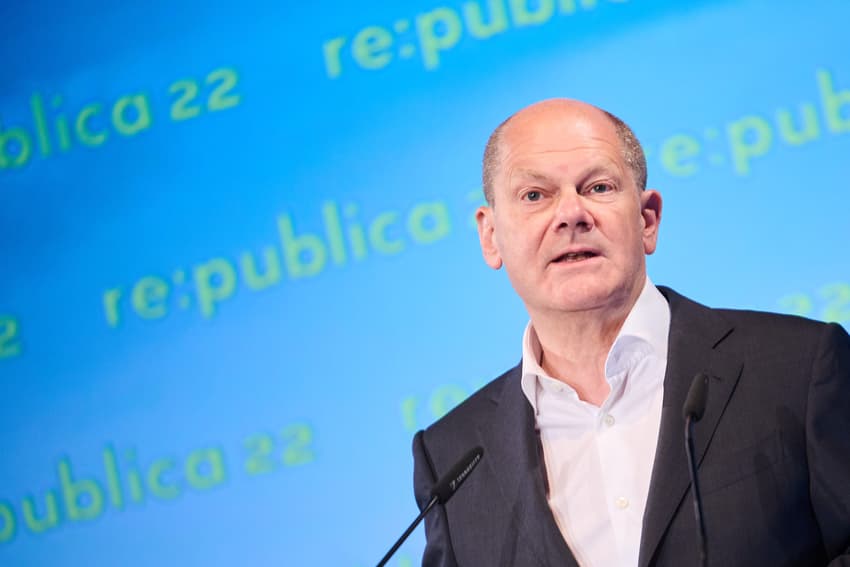Germany's analogue admin is even annoying the chancellor

Chancellor Olaf Scholz has found himself caught in the sticky web of Germany's notoriously outdated administrative processes, he has told a conference on digitalisation.
Scholz had to go and apply for a passport and ID card in person because it was not possible online, the chancellor told the re:publica digital conference in Berlin on Thursday.
"I drove by there, there was no other way," he said, adding that he would like to see such services offered via the internet in the future.
Scholz said Germany had some catching up to do on digitalisation and admitted he was "really surprised" when he recently learned that some of the country's immigration authorities had shelved plans to put more procedures online.
"I can only say that's not the way to go," he said.
Though known for being at the forefront of many technologically advanced industries, Europe's biggest economy has long been criticised for lagging behind when it comes to digitalisation, although the culture is slowly changing.
READ ALSO: What you need to know about dealing with German bureaucracy online
The German weekly WirtschaftsWoche reported this week that the chancellery has no secure line for video calls, meaning Scholz has to get in a car to the defence ministry whenever he has to take part in a sensitive NATO teleconference.
Interesting nugget in WirtschaftsWoche on digitisation in 🇩🇪: the chancellery doesn’t have a secure line for video calls. So whenever Olaf Scholz has to do a sensitive NATO teleconference, he needs to get in a car & drive for 10mins across the Tiergarten to the defence ministry. pic.twitter.com/PtGd5B8uuM
— Oliver Moody (@olivernmoody) June 8, 2022
A solution is envisaged for late 2023, the paper said.
Last year, it emerged that some 1,600 fax machines were still lurking in Berlin's Bundestag house of parliament as the government announced it was finally planning to get rid of them.
In another throwback to the 1980s, Berlin also announced with some fanfare last year that teachers would finally be getting their own email addresses.
Comments
See Also
Scholz had to go and apply for a passport and ID card in person because it was not possible online, the chancellor told the re:publica digital conference in Berlin on Thursday.
"I drove by there, there was no other way," he said, adding that he would like to see such services offered via the internet in the future.
Scholz said Germany had some catching up to do on digitalisation and admitted he was "really surprised" when he recently learned that some of the country's immigration authorities had shelved plans to put more procedures online.
"I can only say that's not the way to go," he said.
Though known for being at the forefront of many technologically advanced industries, Europe's biggest economy has long been criticised for lagging behind when it comes to digitalisation, although the culture is slowly changing.
READ ALSO: What you need to know about dealing with German bureaucracy online
The German weekly WirtschaftsWoche reported this week that the chancellery has no secure line for video calls, meaning Scholz has to get in a car to the defence ministry whenever he has to take part in a sensitive NATO teleconference.
Interesting nugget in WirtschaftsWoche on digitisation in 🇩🇪: the chancellery doesn’t have a secure line for video calls. So whenever Olaf Scholz has to do a sensitive NATO teleconference, he needs to get in a car & drive for 10mins across the Tiergarten to the defence ministry. pic.twitter.com/PtGd5B8uuM
— Oliver Moody (@olivernmoody) June 8, 2022
A solution is envisaged for late 2023, the paper said.
Last year, it emerged that some 1,600 fax machines were still lurking in Berlin's Bundestag house of parliament as the government announced it was finally planning to get rid of them.
In another throwback to the 1980s, Berlin also announced with some fanfare last year that teachers would finally be getting their own email addresses.
Join the conversation in our comments section below. Share your own views and experience and if you have a question or suggestion for our journalists then email us at [email protected].
Please keep comments civil, constructive and on topic – and make sure to read our terms of use before getting involved.
Please log in here to leave a comment.